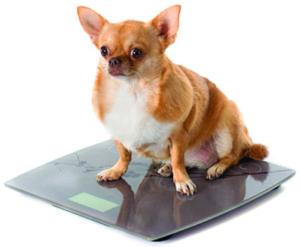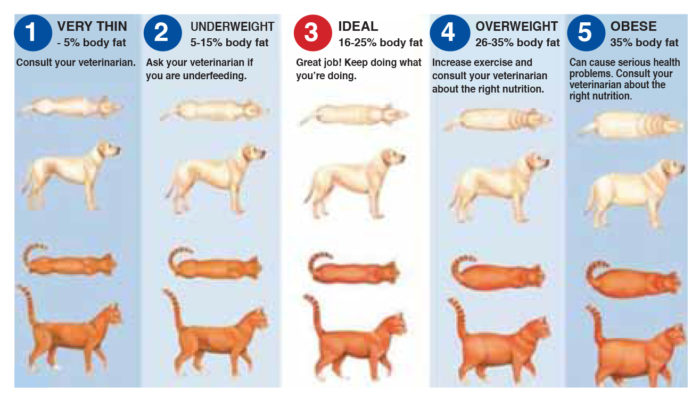 Have you noticed some signs of weight gain – clothes getting a little tighter, getting “winded” climbing stairs, flunked the “pinch an inch” test? As humans, we know what these signs mean and can choose to take corrective dietary and lifestyle steps to reduce our weight. Unfortunately, our pets are dependent on us to help them maintain a healthy weight. Overweight and obese pets can suffer from joint problems and arthritis; develop diabetes, and can experience increased susceptibility to heat stroke. Obesity in pets reduces quality of life ad shortens their lifespan.
Have you noticed some signs of weight gain – clothes getting a little tighter, getting “winded” climbing stairs, flunked the “pinch an inch” test? As humans, we know what these signs mean and can choose to take corrective dietary and lifestyle steps to reduce our weight. Unfortunately, our pets are dependent on us to help them maintain a healthy weight. Overweight and obese pets can suffer from joint problems and arthritis; develop diabetes, and can experience increased susceptibility to heat stroke. Obesity in pets reduces quality of life ad shortens their lifespan.
On October 11, the Association for Pet Obesity Prevention (APOP)* will conduct its tenth annual U.S. pet obesity prevalence survey. Results from their 2016 survey show that 53.9% of dogs and 58.9% of cats are overweight or obese.
A few tips to help keep your pet at a healthy weight:
MONITOR MEALTIMES – For many pets it is best to provide food at mealtimes rather than having their bowl filled with food available at all times. Determine your pet’s calorie needs and divide that into 2 or 3 mini meals. Word of caution – it is important to not cause quick weight loss. Know your pet’s ideal weight and create realistic timelines for weight loss. Avoid giving your pet table food or table scraps because prepared people food is usually higher in salt, sugar and fat content than is healthy for pets.
LIMIT SNACKS OR TREATS – Treats add calories and must be counted as part of your pet’s daily calories. Offer healthy snacks and consider replacing treats with other rewards such as belly rubs, body massage, and extra hugs.
TAKE MORE WALKS – Both of you will benefit from daily walks around the neighborhood or dog park. Start with short walks and watch for signs of over exertion especially if your pet is older or already overweight. In addition to burning calories, brisk walks help strengthen the respiratory and circulatory systems, keep joints flexible, and releases excess energy and alleviate boredom.
Regularly monitor weight – routinely weigh your pet approximately once every two weeks at the same time of day and on the same scale for accuracy. This will help you notice weight loss or gains and maintain a record for your pet’s health file.

“Our pets will thank us for helping them maintain an ideal body weight. They will live longer and happier lives as a result.” ~ Dr. Chad Bower, DVM
*The Association for Pet Obesity Prevention (APOP) was founded in 2005 by veterinarian, Dr. Ernie Ward. http://petobesityprevention.org/
